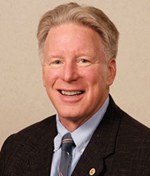
John Lorenz earned an undergraduate B.A., with a double major in geology and in anthropology from Oberlin College in 1972. After serving in the Peace Corps, Morocco, he earned his M.S., with a thesis on a Moroccan Triassic rift basin, at the University of South Carolina (1975), and Ph.D., studying the Nubian Sandstone in Libya and Cretaceous strata in Montana, at Princeton University (1981). John has worked for the U.S. Geological Survey in Louisiana and New Mexico, and for Sandia National Laboratories where he was the geologist for the tight-gas Multiwell Experiment in the Piceance basin. John has been a consultant since 2007, partnering with Scott Cooper in 2008 to form FractureStudies LLC which specializes in fractured reservoir characterization and effects. FractureStudies has counted over 50 companies as clients, working on fractured reservoir projects around the world.
John served as the Elected Editor (2001-2004) and President (2009-2010) of the American Association of Petroleum Geologists. As president, he supported the advancement of the geosciences and their applications to hydrocarbon-related problems. His published papers and presentations on natural and induced fractures in reservoirs range geographically from the Lisburne Limestone in Alaska to the Spraberry Formation in Texas to the carbonates of northern Iraq. These papers and presentations have been awarded the AAPG Levorsen (twice) and Jules Braunstein awards. In 2018 he and Scott Cooper authored two books the “Atlas of Natural and Induced Fractures in Core”. In 2020 they co-authored “Applied Concepts in Fractured Reservoirs” recognized in the Foreword by Dr. Mohammed S. Ameen, Principal Professional in Geomechanics for Saudi Aramco as “a much needed precise and practical treatment of a key topic in the energy industry and beyond... In my view this will become a standard reference for geoscientists and engineers working on fractured reservoirs...the book is well organized and clearly illustrated in an easy to grasp collection of applications for fracture studies". John has worked closely with the oil and gas industry on problems involving reservoir dimensions and in situ permeability, gaining extensive hands-on experience with core analysis and fieldwork. He has led field trips, presented core workshops, and taught short courses for the industry-oriented geological community in numerous places around the world.